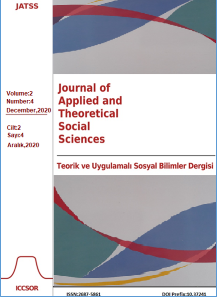The Socio-Political Enigma: The State
Abstract
The state is a multifaceted administrative-political organization that has various functions in different economic systems. Therefore, a simple definition for the state cannot be given in the face of its different role in different economic systems as well as the polymorphic nature it displays to fulfill its capital accumulation function in capitalism. Confined to its role in the capitalist system, two main functions of the state can be discerned: contribution to capital accumulation and legitimization of the system. That the state needs tax revenue to perform its duties makes it necessary for the state to favor capital to foster economic activity. However, the process of capital accumulation gives rise to “public nuisance” and social harm to some groups in the society. To have a peaceful society and secure a social and political system, the second function of the state takes over the job of putting some measures in effect to legitimize the system. Thus, the state is burdened by two opposing and mutually exclusive public functions that are badly needed in capitalism to have a relatively healthy society. Therefore, the state appears as if it is an enigma in terms of its various functions in different systems and polymorphic nature, especially in capitalism.
Metrics
References
Altvater, Elmar (1973), Notes on Some Problems of State Interventionism (I), Kapitalistate, 1/ 1973:97–108. See Barrow, 1993: 178.
Baker, Dean (2016), How Globalization and the Rules of the Modern Economy Were Structured to Make the Rich Richer, Center for Economic and Policy Research.
Barr, Nicholas (2004), Economics of the Welfare State, Oxford University Press, Oxford, UK.
Barrow, Clyde W. (1993), Critical Theories of the State, The University of Wisconsin Press, Madison, Wisconsin, USA.
Barrow, Clyde W. (2016), Toward A Critical Theory of States, Sunny Press.
Bhagwati, Jagdish (2007), In Defense of Globalization, Oxford University Press.
Borchert, Jens and Stephan Lessenich (2016), Claus Offe and the Critical Theory of the Capitalist State, Routledge. DOI: https://doi.org/10.4324/9781315714134
Bourdieu, P. (1993), The Field of Cultural Production, Columbia University Press.
Brown, C. V. and P. M. Jackson (1990). Public Sector Economics, Basil Blackwell, Oxford, UK.
Buğra, Ayşe (2006), Sosyal Politika Yazıları, İletişim Yayınları, İstanbul. DOI: https://doi.org/10.3848/iif.2005.227.8848
Clarke, Simon, ed. (2001), The State Debate, Palgrave, New York, USA.
Claus, Offe (1984), Contradictions of the Welfare State, MIT Press.
Dardot, Pierre and Christian Laval (2009), The New Way of the World, Verso, London, UK.
Dunleavy, Patrick and Brendan O’Leary (1987), Theories of the State, New Amsterdam Books, Chicago, USA.
Garret, Geoffrey and David Nickerson (2001), “Globalization, Democratization, and Government Spending in Middle Income Countries” Working Paper, Yale University.
Gorz, Andre (1989), Critique of Economic Reason, Verso.
Hinrichs, Harley H. (1966), A General Theory of Tax Structure Change During Economic Development, Commerce Clearing House, Inc., Chicago, ABD.
Habermas, Jurgen (1975), Legitimation Crisis, Beacon Press.
Jessop, Bob (2016), The State, Polity Press, Cambridge, UK.
Kaul, Inge et al., ed. (1999), Global Public Goods, The United States Development Programme. DOI: https://doi.org/10.1093/0195130529.001.0001
Marshall, Alfred (1959), Principles of Economics, MacMillan & Co. Ltd. London, UK.
Marshall, Thomas Humphrey (1950), Citizenship and Social Class, Oxford University Press, Oxford, UK.
Miliband, Ralph (1969), The State in Capitalist Society, Basic Books.
Musgrave, Richard A. (1959), The Theory of Public Finance, McGraw-Hill Book Company, Inc., New York, USA.
Musgrave, Richard A. and Peggy B. Musgrave (1989), Public Finance in Theory and Practice, McGraw-Hill Book Company, Inc., New York, USA.
O’Connor, James (2009), The Fiscal Crisis of the State, Transaction Publisher, New Brunswick, USA (Original text appeared in 1973 by St. Martin’s Press).
Offe, Claus (1984), Contradictions of the Welfare State, The MIT Press.
Offe, Claus (1985), Disorganized Capitalism, MIT Press.
Peacock, Alan T. and Jack Wiseman (1967), The Growth of Public Expenditure in the United Kingdom, George Allen & Unwin Ltd., London, UK.
Perkins, John (2005), The New Confessions of an Economic Hit Man, Plume.
Poulantzas, Nicos (1969), The Problem of the Capitalist State, New Left Review 58 (November–December, 1969): 67–78.
Poulantzas, Nicos (1978), Political Power and Social Classes, Verso.
Rodrik, Dani (1998), Why Do More Open Economies Have Bigger Government? Journal of Political Economy, 106 (5): 997–1032. DOI: https://doi.org/10.1086/250038
Skocpol, Theda (2015), States and Social Revolutions, Cambridge University Press.
Skowronek, Stephen (1982), Building a New American State, The Expansion of National Administrative Capacities, 1877–1920, Cambridge University Press. DOI: https://doi.org/10.1017/CBO9780511665080
Sweezy, Paul (1970), The Theory of Capitalist Development: Principles of Marxian Political Economy, Monthly Review Press, New York, USA.
Williamson, J. (2004), A Short History of the Washington Consensus, http://www.iie.com/publications/papers/williamson0904-2.pdf, (accessed on December 20, 2020)






















